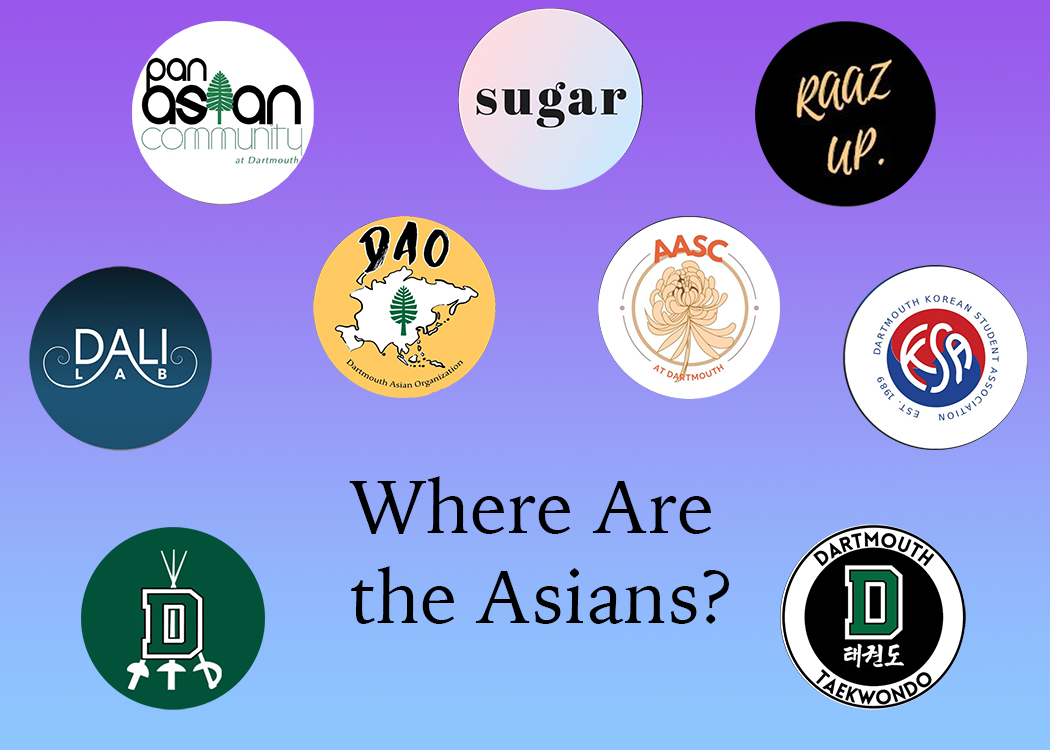
Inspired by 4A's yearly "Where are the Asians" panel, we conducted interviews with a few current Asian and Asian American students to see where they find social connection in today's Dartmouth climate.
Q: What groups regarding racial and cultural identity are available to Asians?
A: Today, the Dartmouth Chinese Cultural Society (DCCS), the Korean Student Association (KSA), the South Asian Student Association, Dartmouth Asian Organization (DAO), and the International Students Association (ISA) are some active organizations that center on Asian racial and cultural identities. These organizations vary in levels of activity and membership and are generally less popular among Asian and Asian Americans on campus than other interest groups not centered around Asian identity.
These groups provide an avenue for Asians and Asian Americans to connect with their identities through food and culture, and also allows them to meet others of both shared and non-shared identities:
"A lot of [members of KSA] are from from Korea, and a lot of us are very American, but it’s like we can all be friends."
"It was nice to talk to other Asians while doing tangentially Asia-related activities [at a DAO event]."
Q: What about other social groups?
A: Today's Asian and Asian American Dartmouth students find community in a variety of interest-based student groups. Often these groups have significant Asian populations due to a common interest.
Students we interviewed were involved with:
- Music groups and performance groups, such as the Dartmouth Chamber and Symphony Orchestras, and the Raaz, Sugarplum, and Street Soul dance groups
- Pre-professional organizations like DALI Lab
- Athletic groups like Dartmouth College Fencing Club and Dartmouth Taekwondo
Q: What if you want to be more politically and administratively involved?
A: Today, the only Asian American centered political group is DAASC (Dartmouth Asian American Studies Collective), which advocates for the institutionalization of Asian American Studies at Dartmouth. However, Asian students are involved in a number of other political and administrative movement-based groups such as the Student Worker Collective and the Palestine Solidarity Coalition.
Q: What do you think about Greek life?
A: Just like all students, Asian and Asian Americans have a wide range of opinions on Dartmouth's Greek life scene. Some students involved in Greek life find it inclusive and note diversity and a presence of people of color in some Greek houses:
"I don't think brothers [at the fraternity] care that much about race. I think they see what someone does and their interests first"
They particularly point to fraternities like Sigma Nu and Zeta Psi as hubs for Asian and other students of color. Some students believe that the trend of Asian students "mobbing together" is more unique to fraternities rather than sororities. However, some still recall microaggressions from other Greek life members and feeling tokenized. Others did not see the need to join Greek life, citing non-identity based issues:
"I just didn't want the scene for myself."
Racial identity also plays a role as students comment that Greek spaces are dominated by white men in particular, and they are the ones who have the ability to use and distribute social capital which can often be exclusive of Asians and other POC.
Q: Why is racial identity important for Asian and Asian American students and their social lives?
A: Again, Asian and Asian American students vary in how salient they think their Asian identities are to them at Dartmouth. Some are hyper-aware of their status as students of color and the invisibility and assumptions that come with it:
"I think about it [my racial identity] constantly."
Many Asian and Asian American students primarily form social circles with others who share their racial identity:
"I'm more likely to connect with people who are Asian American because they understand a lot of things [about me] that non-Asians don't"
And other students are not as conscious of their racial identity and feel as though it does not play as prevalent a role in their everyday life:
"I used to think about it during my freshman year, but not so much anymore."
Nevertheless, Asian and Asian American-ness remains important to Dartmouth's student population, and many students seek out spaces where they can express themselves comfortably.
